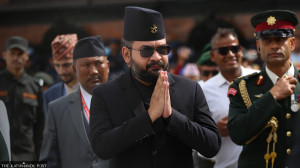Fiction Park
A great storyteller
He had a favourite chair, the one made of bamboo cane, where he used to sit whenever he wanted me to listen to his stories.
Kumar Sharma
He died after two years of being diagnosed with lung cancer. A few drops of tears here and a few running noses there, and he passed away peacefully. Now that he has gone, I miss the stories he used to tell me even after I was already past my teenage years. Not that his stories were entirely new or were captivating by any means. Most of the stories he narrated to me were old folk tales, the ones I had already read somewhere or heard from someone else. But I loved being told a story by my grandpa and the unlikely closeness we had developed over his telling me the stories. I feigned interest in his story even when I knew that the story he was about to narrate was old to me.
He had a favourite chair, the one made of bamboo cane, where he used to sit whenever he wanted me to listen to his stories. And he had a special place too. The verandah on the outer facet of the building would be the place. I used to sit on the mattress beside his chair, listening in rapt attention as he turned himself into a raconteur. On some days when he was extremely keen to narrate the stories to me, he did not even wait for me to change out of my college uniform. As soon as I entered the house, he would almost announce that I, the grandson, would have my afternoon lunch while listening to the story being told by him, the Grandfather. My mother would wince and make a face, mutter something under her breath and take my lunch to the verandah, where Grandfather would be anticipating my arrival while puffing on his crumpled beedi.
“How was school today?” he would ask, not caring to look at me.
“As usual. Do you expect something extraordinary to happen in an ordinary college with ordinary students?” He would laugh at my casual response. I always wondered why Grandfather was fond of me and why he mostly liked talking with me. I can’t remember a single instance when my mother had talked with Grandfather, apart from her telling him, “Here is the tea” or “The food is ready”, to which Grandfather would just nod.
“Have you ever wondered why I tell you stories or why I want you to listen to them?” he asked me one day. I did sometimes think about why Grandfather was telling me all these stories, sometimes even repeating the ones he had already narrated.
“Kind of,” I said.
“You know when I grew up as a child, I always wanted to write. But since writing was yet to be perceived as a profession during my time, I couldn’t pursue writing and instead ended up becoming a shopkeeper.” His confession left me amazed and curious, as I was sure that he had not shared this secret with the other members of his family, not even his son.
“So, you never wrote anything?” I asked with great interest.
“Just a poem here and a few stories there. Nothing substantial. And the fact troubles me a lot.” Grandfather was now more candid than I ever knew he could be.
“Have you figured out what you want to do in your life?” he asked.
“I am not quite sure, but I like to play the guitar and create music.” I was now getting intrigued by where the conversation was heading.
“If you feel like music is your thing, then go for it. Or else, you will grow into another old man who never did what he wanted to do in his life,” he said, adjusting himself into the chair. I said nothing, as I thought about what he had just said. I knew he was right, but I wondered if I had the courage to stand up for myself when questions would be inevitably raised against my choice of interest.
‘And have you ever thought about why I pester you to listen to my stories, monotonous as they might sound to you?” he continued to surprise me as I struggled to come up with an appropriate response, and so I looked away.
“I do that—I narrate stories to you—because I can no longer write in a meaningful way. I try to appease myself by narrating the stories I should have been writing,” Grandfather looked somber as he completed the sentence.
“Does it satisfy you?”
“A little bit. It is good to have something rather than nothing,” he said.
We both fell silent, comfortable in the silence.
It was broken by my mother’s shouting from the kitchen, summoning us for dinner.
“I don’t want you to be sitting with a guitar and forcing your grandson to listen to some songs 30 or 40 years down the line,” he said as he lifted himself from the chair and staggered towards the kitchen. With those words still echoing in my ears, and my mother’s voice getting shriller, I could hardly fathom what was going on in my mind. I slowly trudged towards the kitchen, feeling hungry.




 13.12°C Kathmandu
13.12°C Kathmandu










